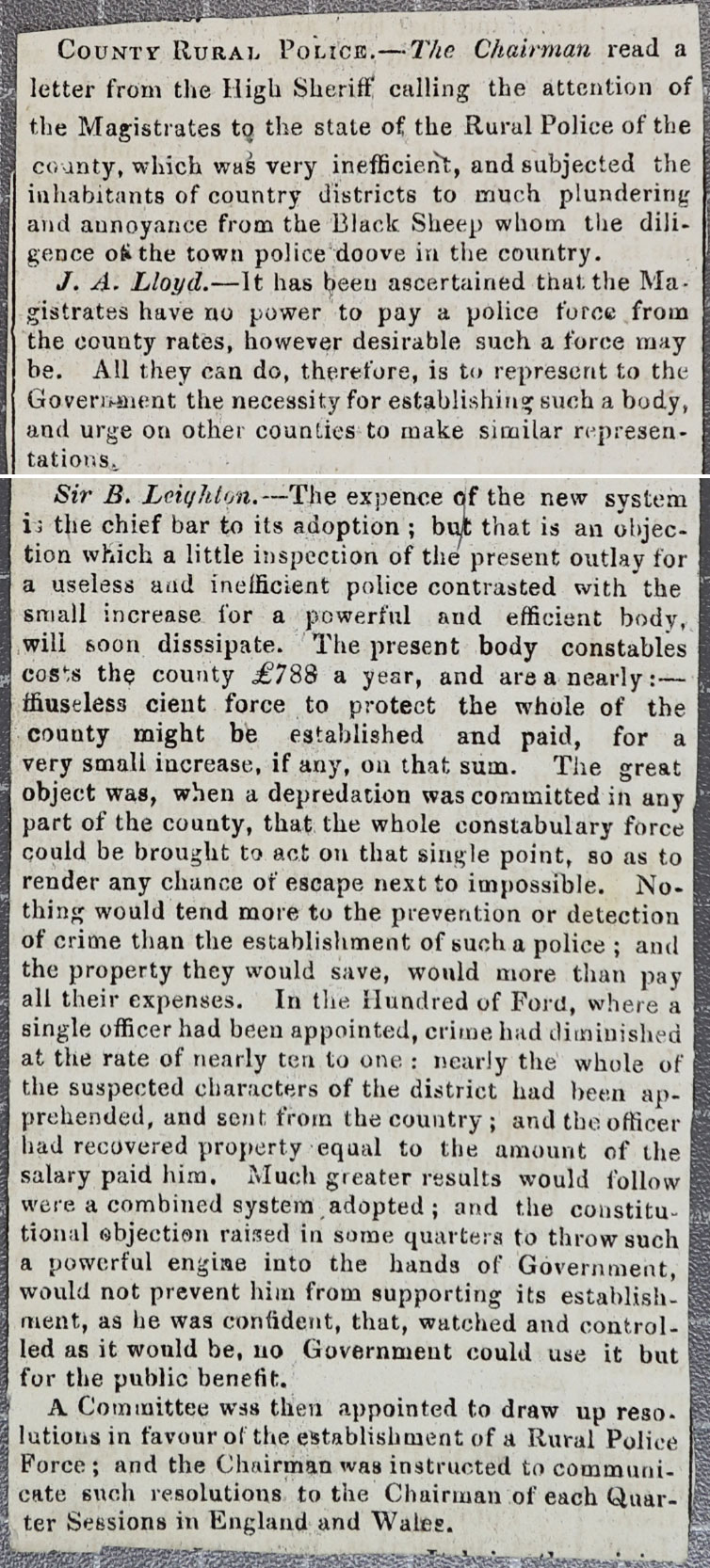
‘Newspaper extracts regarding the establishment of a county rural police force in Shropshire’. c.1835-9. Catalogue Ref. HO 73/3.
Transcript
[Other word meanings given in brackets.]
County Rural Police- The Chairman read a letter from the High Sheriff calling the attention of the Magistrates to the state of the Rural Police of the county, which was very inefficient, and subjected the inhabitants of country districts to much plundering and annoyance from the Black Sheep whom the diligence of the town police drove in the country.
J.A. Lloyd.- It has been ascertained [shown] that the Magistrates have no power to pay a police force from the county rates, however desirable such a force may be. All they can do, therefore, is to represent to the Government the necessity for establishing such a body and urge on other counties to make similar representations.
[…]
Sir B. Leighton- The expense of the new system is the chief bar [obstacle] to its adoption; but that is an objection which a little inspection of the present outlay [cost] for a useless, and inefficient police contrasted with the small increase for a powerful and efficient body, will soon dissipate [crush]. The present body constables cost the county £788 a year and are a nearly: ffiuseless cient [useless inefficient] force to protect the whole of the county; might be established and paid, for a very small increase, if any, on that sum. The great object was, when a depredation [robbery/looting] was committed in any part of the county, that the whole constabulary force could be brought to act on that single point, so as to render any chance of escape next to impossible. Nothing would tend [help] more to the prevention or detection of crime than the establishment of such a police, and the property they would save, would more than pay all their expenses. In the Hundred of Ford [a district of the county], where a single officer had been appointed, crime had diminished [reduced] at the rate of nearly ten to one: nearly the whole of the suspected characters of the district had been apprehended [arrested] and sent from the country; and the officer had recovered property equal to the amount of the salary paid him. Much greater results would follow were a combined system adopted; and the constitutional objection raised in some quarters to throw such a powerful engine into the hands of Government, would not prevent him from supporting its establishment, as he was confident, that, watched and controlled as it would be, no Government could use it but for the public benefit.
A Committee was then appointed to draw up resolutions in favour of the establishment of a Rural Police Force; and the Chairman was instructed to communicate such resolutions to the Chairman of each Quarter Sessions in England and Wales.
- How effective, according to this source, was rural policing in Shropshire?
- Use The National Archives currency converter to work out how much £788 is worth in today’s money.
- What challenges do local magistrates in Shropshire face in setting up a police force like the London Metropolitan Police?
- What arguments does Sir B. Leighton use in favour of setting up a paid rural police force like the Metropolitan Police?
- What can you infer about attitudes to the Metropolitan Police in Shropshire? [Clue: The new Act established a full-time, professional police force for the greater London area under the control of the Home Secretary.]
- Find about the terms of the 1839 Rural Constabulary Act and the County Borough Police Act of 1856. How did they change law enforcement in Britain?
